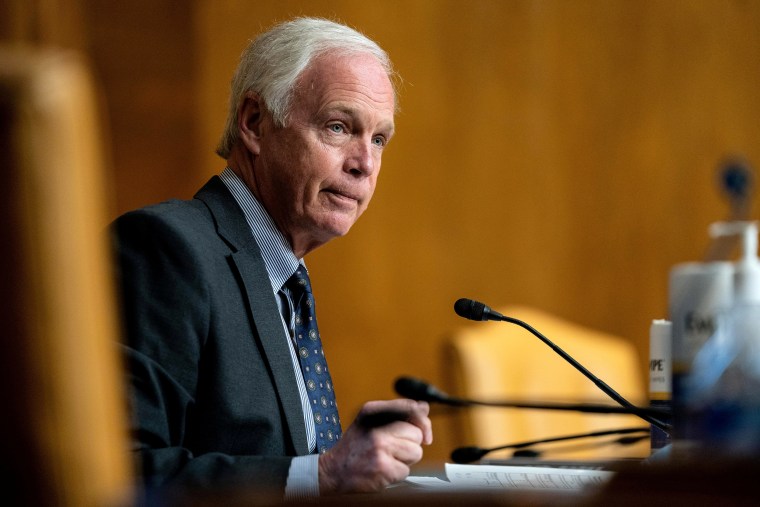In late April, as much of the public started having access to Covid-19 vaccines, Republican Sen. Ron Johnson raised predictable concerns. "What's the point," the Wisconsin senator asked, of trying to get the public vaccinated during a pandemic?
In late December, Johnson's still confused.
During a Fox News appearance this week, the Republican lawmaker called the vaccines "divisive" — which apparently means many on the right don't like them — before sharing these words of wisdom:
"Listen, we all hoped and prayed the vaccines would be 100 percent effective, 100 percent safe, but they're not. We now know that fully vaccinated individuals can catch Covid, they can transmit Covid. So what's the point?"
The point, of course, is that safe, free, and effective vaccines offer protections against a dangerous virus that's already killed over 800,000 Americans. Yes, there are breakthrough infections, but those who are protected are vastly more likely to avoid getting seriously ill, needing hospital care, and/or dying.
I can appreciate why some aspects of epidemiology can be complex, but this isn't one of them. The point of vaccines during a pandemic is pretty basic stuff. An adult in a position of authority — who actually led the Senate committee responsible for domestic security policy for six long years — shouldn't find it confusing.
That's especially true now. To struggle with the basics at the start of a pandemic is unfortunate, but to remain confused about basic details nearly two years later starts to look like willful ignorance.
Johnson's question seems rooted in the idea that if a form of protection doesn't offer a 100 percent guarantee of success, then it's worthless. That's not how reality works. Birth control isn't 100 percent effective, but it's still a responsible thing to take advantage of to prevent unwanted pregnancies.
Similarly, seat belts aren't 100 percent effective in saving lives in serious car accidents, but that doesn't mean they're useless. Your odds of surviving a crash are vastly improved if you buckle up.
It matters that Johnson finds this baffling, but even more important is the fact that some of the Fox News viewers who saw the senator's on-air comments may not realize how oblivious he is to basic information.
Indeed, the Wisconsin Republican has been a uniquely unconstructive voice throughout the public health conversation. The New York Times noted in the spring that Johnson "has become the Republican Party's foremost amplifier of conspiracy theories and disinformation now that Donald Trump himself is banned from social media."
Unfortunately, we're routinely reminded that the GOP senator has invested an unnerving amount of effort into proving the analysis right — as evidenced by his recent assertion that people should use mouthwash as a coronavirus treatment.
Listen, we all hoped and prayed that mouthwash would be 100 percent effective, but it's not. We now know that individuals who use mouthwash can catch Covid, they can transmit Covid. So what's the point?
All joking aside, this dovetails with the larger significance of Johnson's unfortunate comments: The senator has been eager to recommend all kinds of medicinal responses to Covid-19, except the readily available life-saving vaccines.
The Wisconsin Republican has touted hydroxychloroquine, despite its ineffectiveness. He's pushed ivermectin, despite its ineffectiveness. YouTube found it necessary to suspend the senator's account in June because of his videos filled with misinformation about treatments.
But all the while, Johnson has also spent months desperately trying to undermine public confidence in the vaccines people need to get in order to properly deal with the Covid threat.
Unfortunately, it's part of a pattern of irresponsible misconduct. Circling back to our earlier coverage, in mid-March 2020, as the scope of the coronavirus crisis was just coming into view, the Wisconsin Republican went further than most in downplaying the importance of mitigation efforts. As part of his case, the senator told the Milwaukee Journal Sentinel, "[W]e don't shut down our economy because tens of thousands of people die on the highways. It's a risk we accept so we can move about." This was a tragically bad argument, for reasons he didn't seem to fully grasp.
A couple of months later, Johnson was seen on the Senate floor without any facial covering. "I wear a mask when I go into grocery stores, that type of thing," the GOP senator said. "I think around here, we probably won't have to." This, too, was wrong.
In July 2020, Johnson argued that the United States "overreacted" in response to the coronavirus pandemic, which was unfortunate at the time, and which is a perspective that looks much worse now.
In late 2020, Johnson sunk lower, holding multiple Senate hearings to promote pseudo-science and conspiracy theories. Dr. Ashish Jha, dean at Brown University School of Public Health, appeared as a witness at one of the Senate hearings and was amazed by the Wisconsin senator's apparent suspicion that there's a "coordinated effort by America's doctors" to deny patients hydroxychloroquine because of a corrupt scheme involving physicians and the pharmaceutical industry.
In 2021, as vaccines and boosters became available to the public at large, Johnson — who claims he is not an opponent of vaccines — has gone to great lengths to discourage Americans from doing the smart thing.
As we've discussed, when it comes to taking stock of the Wisconsinite's propensity for peddling nonsense, it's convenient to rely on separate categories. For example, the GOP senator has been cavalier about his indifference to an FBI warning that he was "a target of Russian disinformation" during the last election cycle. He's also denied ever having "talked about the election being stolen," despite ample evidence pointing in the opposite direction. Johnson's nonsense about the Jan. 6 attack has been ridiculous, and so has his rhetoric about Viktor Orban, Hungary's controversial prime minister.
But when it comes to public health, the Republican's rhetoric about the pandemic has been simply indefensible.

